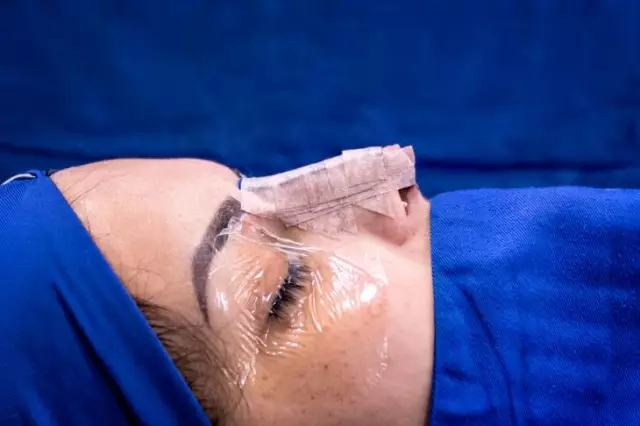- Author Rachel Wainwright wainwright@abchealthonline.com.
- Public 2023-12-15 07:39.
- Last modified 2025-11-02 20:14.
8 unusual symptoms of severe ailments
The words "disease" and "sick" do not come from the same root - "pain". As a rule, the symptoms of ailments seriously spoil the life of patients. However, there are exceptions to this rule: signs of some diseases can even cause positive emotions. The only pity is that most of these ailments are severe and incurable.
Thermanesthesia
In patients suffering from malignant neoplasms of the brain or having suffered complex spinal injuries, sometimes there is a complete insensitivity of the skin to high and low temperatures (thermal anesthesia). Such a patient hardly distinguishes a piece of ice from a hot frying pan by touch. This feature could be considered convenient if it were not for the risk of getting a thermal burn, simply not noticing what you are touching.

Source: depositphotos.com
Hyperesthesia
The increased susceptibility of the senses to stimuli (hyperesthesia), on the one hand, causes significant inconvenience, since not only pleasant (the touch of a cozy fur on the skin, the scent of a flower), but also unpleasant sensations seem to be overly intense. But such people can perceive sounds, smells and even shades of color with amazing strength and saturation. Unfortunately, this property appears in patients suffering from tuberculosis, increased anxiety and emotional instability.

Source: depositphotos.com
Terminal stage euphoria
Doctors working in the intensive care unit sometimes observe this phenomenon, which characterizes the active process of decomposition of internal organs and tissues. Decay products that enter the bloodstream reach the brain and poison it, turning off the mechanism for the passage of nerve impulses. A person ceases to feel pain, even the instinct of self-preservation refuses. The patient claims to be completely cured. He is cheerful, cheerful and active. This condition is a direct precursor to agony.

Source: depositphotos.com
Compliance with multiple sclerosis
This disease is characterized by a gradual (over several decades) extinction of all body functions. At a certain stage, approximately 15% of patients begin to show indifference to their condition and an inadequate response to troubles. In events that would cause fear or grief in a normal person, such a patient unexpectedly finds positive and even pleasant sides. For example, the prospect of not learning how to walk is seen as an excuse for choosing a particularly fashionable wheelchair.

Source: depositphotos.com
Narcolepsy
Narcolepsy can be the result of traumatic brain injury, brain tumor, etc. The symptom manifests itself in frequent uncontrolled falling asleep (usually for several minutes with an hour break). On the one hand, this greatly reduces the quality of life: patients experience difficulties with socialization and are unable to work normally. Going out on the street can lead to their death. On the other hand, they acquire a fabulous ability to control the content of their dreams. In practice, the narcoleptic constantly watches dreams, which he himself directs.

Source: depositphotos.com
Hyperbulia
One of the diagnostic signs of manic-depressive psychosis. Patients periodically feel like heroes: strong, confident, active and successful. This is not only an illusion: doctors note that their patients do often get what they want, because they hardly notice the obstacles.

Source: depositphotos.com
Youthfulness
Elastic, fresh skin, bright blush, saturated lip color are not always a sign of good health. If a fifty-year-old looks about thirty, it is quite possible that he is seriously ill. Too youthful appearance is a symptom of tuberculosis, mitral stenosis and some other dangerous diseases.

Source: depositphotos.com
Moria
Sometimes you can meet a person who, in any setting, seeks to entertain others. He is distinguished from an ordinary merry fellow by a noticeable inadequacy: he does not in any way assess the appropriateness of his jokes, and he gets too much pleasure from the laughter they cause. And he jokes all the time, unable to break away from this occupation even for a short time. The reason here is not a light character or some shamelessness: such a person most likely has an organic pathology of the frontal lobes of the brain.

Source: depositphotos.com
Some of the symptoms described may seem comfortable or even pleasant, but do not forget that the people who show them suffer from serious ailments. They need at least understanding from others.
YouTube video related to the article:

Maria Kulkes Medical journalist About the author
Education: First Moscow State Medical University named after I. M. Sechenov, specialty "General Medicine".
Found a mistake in the text? Select it and press Ctrl + Enter.






